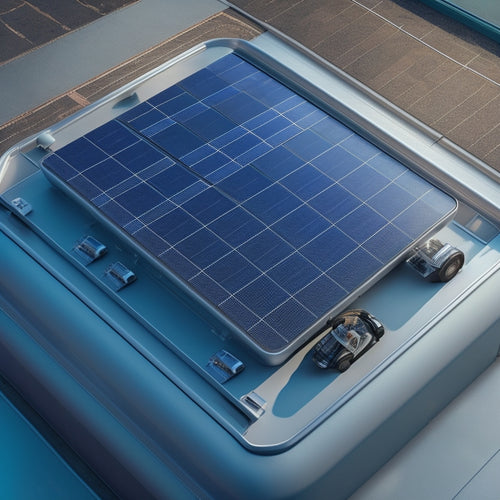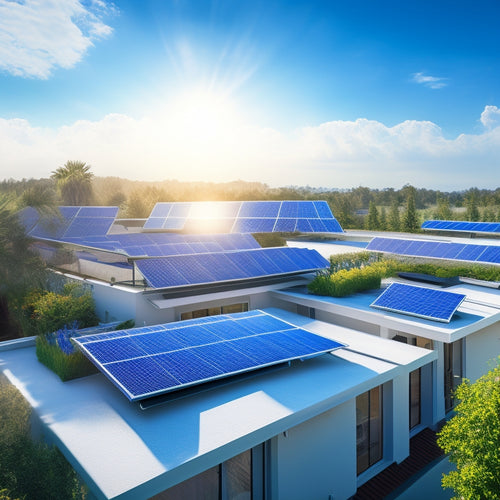
Choosing the Right Solar Panel Design Company
Share
When choosing a solar panel design company, you need to assess multiple factors to guarantee a successful partnership. Start by understanding your solar needs, including energy potential, budget, and roof size. Then, research design companies online, evaluating their reputation, experience, and certifications. Assess the proficiency of their design team, including industry certifications and software skills. Compare design processes, considering cost versus quality factors, and verify warranty and support options. Additionally, check for physical office locations and review product selections. By carefully evaluating these factors, you'll be well-equipped to select a company that meets your needs - and there's more to investigate in this critical decision-making process.
Key Takeaways
- Assess your solar needs by evaluating roof sunlight exposure, energy usage, and budget to set realistic energy goals.
- Research design companies through online reviews, customer feedback, and project portfolios to gauge reputation and service quality.
- Evaluate a company's expertise by verifying industry certifications, experience, and specialized skillsets in electrical and mechanical engineering.
- Compare design and installation processes, including project duration, milestone tracking, and quality control measures.
- Balance cost and quality by considering long-term savings, durability, and comprehensive warranties when selecting a solar panel design company.
Understanding Your Solar Needs
Understanding Your Solar Needs
Your roof receives a specific amount of sunlight throughout the day, and understanding how that sunlight translates into energy is crucial in determining your solar needs. To accurately assess your solar needs, you'll need to evaluate factors like your energy usage, roof size, and orientation. This information will help you set realistic solar energy goals and determine the number of panels required to meet those goals.
You'll also need to take into account budget considerations, such as the upfront cost of installation and the potential long-term savings.
It's vital to establish a clear understanding of your solar needs to verify you're investing in a system that meets your energy requirements and fits within your budget. By taking the time to understand your solar needs, you'll be better equipped to make informed decisions when selecting a solar panel design company.
This will ultimately lead to a more efficient and cost-effective solar energy system that meets your unique needs and goals.
Researching Design Companies Online
Numerous online platforms and review websites can connect you with a vast array of solar panel design companies, providing you with a wealth of information to aid in your selection process.
You can start by searching for design companies in your area and reading online reviews from past customers. This will give you an idea of their reputation, quality of work, and customer service. Look for reviews on platforms like Yelp, Google, and SolarReviews, which cater specifically to the solar industry.
Next, visit the companies' websites to review their design portfolios. A professional design company will showcase their past projects, highlighting their proficiency and design capabilities.
Pay attention to the types of solar panel systems they've designed, the complexity of the projects, and the quality of their designs. This will help you determine if they've the necessary proficiency to handle your specific solar needs.
Evaluating Company Experience Levels
Evaluating Company Experience Levels
Knowledge is the cornerstone of a successful solar panel design company, and evaluating a company's experience level is essential in determining their capability to provide a high-quality design that meets your specific needs. You want a company that has a proven track record of executing successful projects, and that's where their project portfolio comes in.
Review their portfolio to see the types of projects they've completed, the scale of those projects, and the challenges they've overcome. This will give you an idea of their capabilities and whether they can handle a project of your scope.
Also, look into their industry partnerships. Are they partnered with reputable companies? Do they've relationships with leading manufacturers and suppliers? These partnerships can indicate a company's level of knowledge and their ability to stay up-to-date with the latest technologies and trends.
Assessing Design Team Expertise
When evaluating a solar panel design company's team proficiency, you'll want to verify industry certifications, such as NABCEP, that demonstrate the team's technical knowledge and skills.
You should also investigate the team lead's experience, as their proficiency will greatly impact the quality of the design.
Additionally, you'll need to ascertain the team possesses specialized skillsets, such as electrical and mechanical engineering, to handle complex design requirements.
Industry Certifications Matter
Several industry certifications can attest to a solar panel design company's competence, and you should look for them when evaluating the design team. These certifications demonstrate a company's proficiency in designing and installing solar panel systems that meet industry standards.
The importance of certifications lies in guaranteeing that the design team has the necessary knowledge and skills to design a system that's safe, efficient, and reliable.
When evaluating certifications, look for ones from reputable organizations such as the North American Board of Certified Energy Practitioners (NABCEP) or the International Association of Electrical Inspectors (IAEI). NABCEP offers certifications for solar panel installers, designers, and inspectors, while IAEI provides certifications for electrical inspectors.
Other types of certifications include UL (Underwriters Laboratories) certification, which verifies that the design meets safety standards, and IEEE (Institute of Electrical and Electronics Engineers) certification, which attests to the design team's knowledge of electrical systems.
Team Lead Experience Counts
Many experienced solar panel design companies have a seasoned team lead who oversees the design process. This individual is responsible for guaranteeing that your project meets your energy goals and is completed on time and within budget.
As you evaluate design companies, you'll want to assess the team lead's experience and proficiency. Look for a track record of successful project management and team collaboration. A skilled team lead will effectively allocate resources, prioritize tasks, and facilitate open communication among team members. This guarantees that your project stays on track and that potential issues are addressed promptly.
When you ask about the team lead's experience, pay attention to specific examples of how they've overcome design challenges and managed complex projects. A seasoned team lead will be able to provide concrete examples of their problem-solving skills and ability to manage competing priorities.
Specialized Skillsets Needed
You'll want to dig deeper into the design company's team knowledge to confirm they've the necessary specialized skillsets to tackle your project. This includes evaluating the design team's technical proficiency in areas like electrical engineering, mechanical engineering, and materials science.
Look for evidence of design innovation, such as unique panel layouts, custom mounting systems, or proprietary tracking algorithms.
When reviewing the team's proficiency, consider their experience with solar panel design software like Helioscope, Aurora, or SketchUp. Have they worked with similar projects, such as residential, commercial, or utility-scale solar installations? Do they've knowledge of local building codes, permits, and regulatory requirements?
A sturdy team should comprise professionals with diverse skillsets, including engineers, designers, and project managers. Confirm they can provide detailed project timelines, resource allocation plans, and quality control procedures.
Reviewing Customer Testimonials Online
One essential aspect of researching a solar panel design company is reviewing customer testimonials online. You want to get a sense of the company's reputation and customer satisfaction. This can be done by checking out their website, social media, and review platforms like Yelp or Google Reviews.
When reviewing customer testimonials online, pay attention to:
- The overall rating and number of reviews
- Specific comments about the company's communication, installation process, and technical skill
- Any complaints or issues and how the company responded to them
- If the company actively engages with customers on social media and responds to feedback
Analyzing Company Certifications Held
When vetting a solar panel design company, an essential step is to analyze the certifications they hold, as these credentials can greatly impact the quality of their work. You want to verify that the company has the necessary qualifications to design and install a solar panel system that meets your energy needs.
Look for certifications from reputable organizations such as the North American Board of Certified Energy Practitioners (NABCEP) or the International Association of Electrical Inspectors (IAEI). These certifications indicate that the company has met rigorous certification standards and has the necessary knowledge to design and install solar panel systems that meet industry standards.
Check the company's website or ask them directly about their certifications. Be wary of companies that don't disclose their certifications or can't provide proof of their credentials.
A company with the right certifications is more likely to provide a high-quality solar panel system that meets your energy needs and complies with local building codes and regulations. Remember, a company's certifications are a key indicator of their skill and commitment to quality, so don't overlook this critical step in the vetting process.
Comparing Design Process Efficiency
When evaluating solar panel design companies, you'll want to compare their design process efficiency to guarantee your project is completed on time and within budget.
Two key metrics to take into account are the time to project completion and the number of design iteration cycles required.
Time to Project Completion
Your solar panel project's timeline is critical, and the design company's efficiency plays a significant role in meeting your deadlines. A company's ability to manage project timelines efficiently can make or break your project's success.
When evaluating a design company, consider their project timeline efficiencies and how they track completion milestones. This will give you an idea of how quickly they can move your project forward.
Some key indicators of a company's efficiency include:
-
Average project duration: How long does it take them to complete a project similar to yours?
-
Project milestone tracking: Do they've a clear system in place to track and meet deadlines?
-
Design iteration cycles: How quickly do they respond to changes and revisions?
- Client communication: How frequently do they keep you updated on project progress?
Design Iteration Cycles
Most solar panel design companies undergo multiple design iteration cycles before finalizing a project, and this process can greatly impact the overall project timeline. You'll want to choose a company that can efficiently maneuver through these cycles to meet your deadline.
A design iteration cycle typically consists of design development, prototype testing, and design feedback. The number of cycles required depends on the complexity of your project and the company's design process.
When evaluating a design company, look for their design iteration cycle efficiency. Ask about their average number of cycles per project and how they manage the process. A company that can complete a project in fewer cycles is likely to save you time and money.
Also, find out how they incorporate design feedback and prototype testing into their process. This will give you an idea of their ability to identify and address potential issues early on.
Weighing Cost Versus Quality Factors
Frequently, homeowners find themselves torn between the desire for high-quality solar panels and the need to stay within budget. This dilemma is understandable, as you want to confirm you're getting the best possible system for your home while also being mindful of budget constraints.
When evaluating cost versus quality factors, consider the following:
-
Long-term savings: While high-quality solar panels may be more expensive upfront, they can provide significant long-term savings through increased energy production and reduced maintenance costs.
-
Quality assurance: Look for companies that offer strong quality assurance processes, including rigorous testing and inspections, to confirm your solar panels meet the highest standards.
-
Durability and lifespan: High-quality solar panels are built to last, with a longer lifespan and reduced degradation over time, resulting in more consistent energy production.
- Warranty and support: A reputable company will offer an all-encompassing warranty and dedicated support, giving you peace of mind and protection for your investment.
Checking Physical Office Locations
When choosing a solar panel design company, you should check if they've a physical office location in your area, as a local presence can guarantee timely responses to your queries and site visits.
Having a regional office also implies that the company has knowledge of local building codes, regulations, and environmental conditions, which is vital for a successful solar panel installation.
Local Office Presence
Your search for a reliable solar panel design company shouldn't overlook the importance of a local office presence. Having a physical office in your area indicates that the company is committed to understanding local market trends and is invested in your community. This is essential because local offices are more likely to have staff who are familiar with local building codes, permitting processes, and environmental factors that may impact your solar panel installation.
A local office presence also suggests a higher level of community engagement, which can lead to:
- Better customer service and support
- Faster response times to issues and concerns
- More accurate assessments of your energy needs
- Greater accountability and transparency in their operations
When evaluating a solar panel design company, make sure to check if they've a physical office in your area. This can give you peace of mind knowing that they're committed to serving your community and are more likely to provide you with the best possible service.
Regional Expertise Matters
Their regional knowledge is a critical factor in designing and installing solar panels that cater to your specific needs. You should prioritize a company with regional proficiency, as they're better equipped to maneuver local regulations and cultural factors that impact your solar panel installation.
A company with regional knowledge will guarantee your solar panels comply with local building codes, zoning laws, and permits. They'll also consider cultural factors, such as roof orientation and shading patterns, to optimize energy production.
When evaluating a company's regional proficiency, check their physical office locations. A company with a local presence is more likely to have comprehensive knowledge of the region's specific challenges and opportunities.
They'll be more familiar with local weather patterns, soil conditions, and environmental factors that affect solar panel performance. By choosing a company with regional proficiency, you'll get a customized solution that addresses your unique needs and maximizes your energy output.
Verifying Warranty and Support Options
As you traverse the solar panel design company selection process, verifying warranty and support options becomes essential to guarantee a hassle-free experience. You need to confirm that the company you choose stands behind its products and services, providing you with the necessary backup in case something goes wrong.
When evaluating warranty and support options, consider the following key aspects:
-
Thorough warranty terms: Are the warranty terms clear, concise, and thorough? Do they cover all aspects of the solar panel system, including materials and workmanship?
-
Multiple support channels: Are there multiple support channels available, such as phone, email, and online portal? Are they easily accessible and responsive to your queries?
-
Dedicated customer support team: Is there a dedicated customer support team that can address your concerns and provide timely resolutions?
- Extended warranty options: Are extended warranty options available, providing you with additional peace of mind and protection for your investment?
Frequently Asked Questions
Can I Customize My Solar Panel Design to Fit My Roof's Unique Shape?
You can customize your solar panel design to fit your roof's unique shape by exploring custom design options that consider roof compatibility assessment, ensuring a seamless integration that maximizes energy output and optimizes your roof's potential.
How Long Does a Typical Solar Panel Installation Project Take?
You'll typically spend 2-6 months on a solar panel installation project, with the installation timeline broken down into project phases: assessment, design, permitting, installation, and inspection, with each phase taking around 1-3 weeks to complete.
Are Solar Panels Resistant to Extreme Weather Conditions Like Hail?
You'll be relieved to know that solar panels are built to withstand extreme weather conditions, including hail impact, thanks to rigorous testing for weather durability, ensuring your system remains functional and efficient even in harsh climates.
Can I Install Solar Panels on a Metal or Clay Tile Roof?
You'll be delighted to know that, yes, you can install solar panels on a metal or clay tile roof, but be aware of metal roof considerations, such as ensuring a secure attachment, and clay tile compatibility, which may require specialized mounting systems.
Will My Solar Panels Still Generate Power During a Blackout?
You'll be glad to know that your solar panels will still generate power during a blackout, but you'll need blackout solutions like a battery storage system to utilize energy, maintaining ideal solar panel efficiency.
Related Posts
-

Top Solar Panels for Car Battery Maintenance
When selecting top solar panels for car battery maintenance, consider high-efficiency models with high wattage output...
-

Why Cities Need Smart Charging Infrastructure Now
You're about to experience a tidal wave of electric vehicles hitting your city's streets, and it's essential you're p...
-

Best Solar Panel Options for Maximum Energy Savings
You can maximize your energy savings with solar panels that boast efficiency ratings above 20%, paired with extensive...


